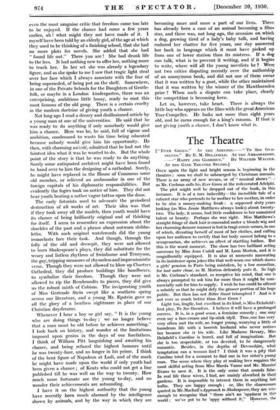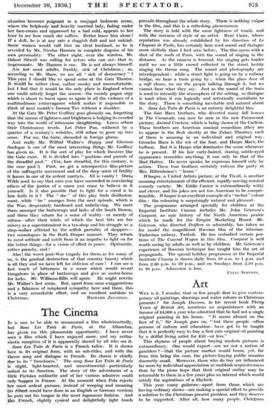The Theatre
L" EVER GREEN." AT Tun ADEITIII.—" To Szp Cum- SELVES." By E. M. DELAPIELD. AT THE AMBASSADORS. —" HAPPY AND GLORIOUS." BY WILFRID WALTER. AT THE GATE THEATRE STUDIO.] ONCE again the light and bright season is beginning in the theatres : soon we shall be submerged by Christmas annuals. There is an array of new revues, or of " musical shows "- as Mr. Cochran calls his Erer Green at the redecorated Adelphi.
The plot might well be dropped out of the book, in this instance. It is of a rare imbecility—the incredible tale of a cabaret star who pretends to be mother to her mother, in order to he also a money-making freak : a supposed sixty years looking (as Miss Jessie Matthews always looks) about twenty- two. The lady, it seems, had little confidence in her unassisted talent or beauty. Perhaps she was right. Miss Matthews's straight fringe of dark hair is concealed under a blonde wig and her charming demure manner is lost in tragi-comic scenes, in one of which, divesting herself of most of her clothes, and calling upon her audience to certify that her body cannot belong to a sexagenarian, she achieves an effect of startling bathos. But this is the worst moment. The show has two brilliant acting successes by Miss Jean Cadell and M. Leon Morton, and it is magnificently equipped. It is also at moments nauseating in its insistence-upon jokes like that well-worn one which shows a girls' pension in Paris being mistaken, by a low comedian, for tout (wire chose, as M. Morton delicately puts it. So high is Mr. Cochran's standard, so receptive his mind, that one is always prompted to ask him for more than it might be com- mercially safe for him to supply. I wish he too could be offered a subsidy so that he might defy the grosser portion of his huge public. But then has not Bitter Sweet triumphed ? And is it not ever so much better than Ever Green ?
Light too, fragile, but excellent in its kind, is Miss Delafield's first play, To See Ourselves. . I believe it will have a prolonged success. It is, in a good sense, a feminine comedy ; one may even say a face-cream and lip-stick idyll. True,one has very very often met the wife, no longer young, wearying a little of humdrum life with a boorish husband who never notices her because she is his wife. Like Madame Boyary, Miss Delalleld's Caroline is bored, and full of imagination. , But she is too respectable, or too devoted, to be dangerously romantic. Besides, in the depths of Devonshire, what temptation can a woman find ? I think it was a pity that Caroline tried for a moment to find one in her sister's young man. The scene where they play at making love requires the most skilful acting from Miss Marda Vanne and Mr. Mauriei Evans to save it. It is the only scene that sounds false. In real life these wives, I find, are mainly absorbed in their gardens. It is impossible to interest them in anything but bulbs. They are happy enough ; or, like the charwoman quoted in Mr.MackairsApproach to Shakespeare, they are .wise enough to recognize that " there ain't no 'appiness in this world ; we've got to he 'appy without it." Howe-vet, the situation becomes poignant in a conjugal bedroom scene, where the helplessly and heavily married lady, fading under her face-cream and oppressed by a bad cold, appeals to her faint' to see how much she suffers. Better leave him alone Ira dolt, he is at any rate a sluggish dolt and not unkind. Some women would call him an ideal husband, as he is revealed by Mr. Nicolas Hannen in complete disguise of his own ,personality. The other night, over the wireless, Mr. Osbert Sitwell was calling for actors who can act—that is, impersonate. Mr. Hannen is one. He is not always himself. . Are not most adults, frankly, sick of Christmas ; as, according to Mr. Shaw, we are all " sick of democracy " ? This year I should like to spend mine at the Gate Theatre. It 1 'Okda be rather close, rather smoky and uncomfortable, but I feel that it would be the only place in England where one could utterly forget the season—the mainly pagan orgy which is nbout to burst upon us again in all the violence of a multitudinous extravagance which makes it impossible to think of next month's Income Tax without a shudder. At the Gate Mr. Peter Godfrey goes gloomily on, forgetting that. the season of lightness and brightness is bulging its overfed way into the world of inhumane slaughtering. Leave others their Christmassy revels. Let Peter Pan, withered by a quarter of a century's wrinkles, still refuse to grow up into sense. For me, the Gate, shrouded in foreign gloom.
And really Mr. Wilfrid Walter's Happy and Glorious duologue is one of the most interesting things Mr. Godfrey has given us. It is the sort of play for which theatres like the Gate exist. It is divided into " portions and parcels of the dreadful past." (Yes, how dreadful, for this century, is the near past !) First, we get a retrospective film-picture of the suffragette movement and of the deep sense of futility it leaves in one of its ardent martyrs.. All is vanity ! Oscar Wilde used to say that once you have succeeded in convincing others of the justice of a cause you cease to believe in it yOurself. Is it also possible that to fight for a creed is to lose faith in it ? The " she " of this play finds disillusion- ment, while " he " emerges from the next episode, which is the War, desperately hardened and unbelieving. We meet them amongst the buttercups and larks of the South Downs, and • there they return for a sense of reality—or merely of release—after their trials, of which the best bits are her misery as a superintendent in a tea-shop and his struggle as a shop-walker afflicted by the selfish garrulity of shoppers— two monologues in the Ruth Draper manner. They return to rural solitude and catch from it an impulse to fight on for time better things—for a vision of effort in peace. Optimistic, rather preachy, end !
Alas! the Worst post-War tragedy for them, as for many of us, is the gradual destruction of that country beauty which is all they and we have left for oblivion of care ! I can see a last touch of bitterness in a scene which would reveal Iffingalows in place of buttercups and give us motor-horns for kirks. Mr. Williams-Ellis will agree. He might rewrite Mr. Walter's last scene. But, apart from some exaggerations and a falseness of misplaced sympathy here and there, this is a very remarkable effort, and an excellent antidote to







































 Previous page
Previous page